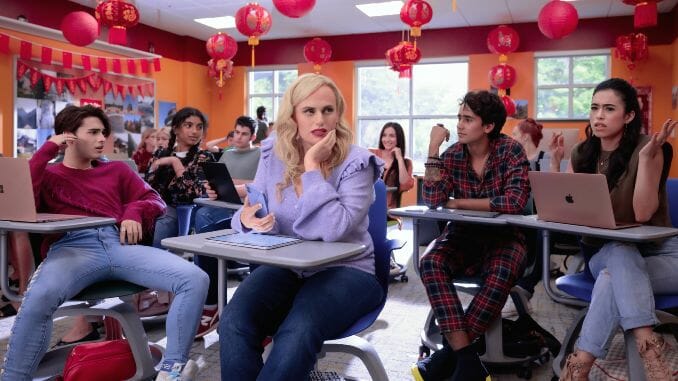Rebel Wilson’s Generation-Gap High School Comedy Senior Year Should Be Held Back

The making of generation-gap comedy has—like so much other comedy—become fraught with incompetence and indifference. It’s difficult to generate the necessary perceptive social observations when so many film and TV writers are still blanket-referring to anyone under 30 as millennials, seemingly unaware that Gen Z not only exists but is rocketing toward their obligatory quarter-life crisis. (Similarly, plenty of Gen-Xers have been incorrectly categorized as boomers for years.) The new comedy Senior Year offers brief hope that filmmakers actually pay attention to this stuff. In its opening minutes, it tracks the journey of teenager Stephanie Conway (Angourie Rice) from insecure underclassman nerd in 1999 to popular (though still secretly insecure) queen bee in 2002. While the movie isn’t explicit about tracking the cultural changes that saw the end of alt-rock give way to the lip-glossed, boy-banded poptimism of the early ‘00s, there’s a tremor of recognition in watching Stephanie contort herself to fit into the model of the plastic, self-aware teen movies of that era. Plenty of teenagers change with the times; Stephanie just sets upon her metamorphosis more consciously than some.
The movie then ups the ante by pulling the temporal rug out from under its of-the-moment heroine. After a grim cheerleading accident, Stephanie falls into a coma, where she stays for 20 years. Now played by Rebel Wilson, she wakes up in 2022 to a vastly different world, and feels understandably robbed of the prom-queen glory she was poised for back in ’02. Her displacement fits with the initial turn-of-the-century time period: Stephanie’s She’s All That transformation and Bring It On lifestyle have become, instead, a more promiscuous version of Never Been Kissed—because she insists on re-enrolling in high school to finish out her final month and reclaim her crown, metaphorically and literally. She assembles a multi-step plan to become popular, head the cheerleading squad and win prom queen. (First obstacle: The titles of prom king and queen have been long-since abolished.)
It’s absurd, of course, that a 37-year-old would be allowed to step back into her alma mater, interacting with a bunch of underage classmates, including Brie (Jade Bender), the daughter of Stephanie’s old nemesis Tiffany (Zoë Chao). But Stephanie’s less popular bestie Martha (Mary Holland) has become principal of their old high school, while their friend Seth (Sam Richardson) has just started working as a librarian, and they gingerly support her efforts to restart her life while attempting to steer her away from her most superficial fantasies. Director Alex Hardcastle nails the visual language of Stephanie’s headspace: When she rolls up for her first day of school, she imagines herself in a note-perfect imitation of her heyday’s McG music video aesthetic.
For a while, the movie fills out the caricatured high-concept ridiculousness of its premise with surprising nuance that refuses to indulge pronouns-in-bio sneering at the younger generation. Brie’s social success with this crowd has an especially novel, Gen Z twist: She’s the queen bee as a manicured high school brand who, as another character explains, is friendly to everyone without actually having many genuine friends. Direct cruelty is no longer social capital—there’s a funny, spot-on runner about how Stephanie traffics in coarse ‘00s-era terms of not-quite-endearment like “sluts” and “hobags,” much to the confusion of contemporary teenagers—yet virtual castes still form.
-

-

-

-

-

-

-

-

-

-

-

-

-

-

-

-

-

-

-

-

-

-

-

-

-

-

-

-

-

-

-

-

-

-

-

-

-

-

-

-








































